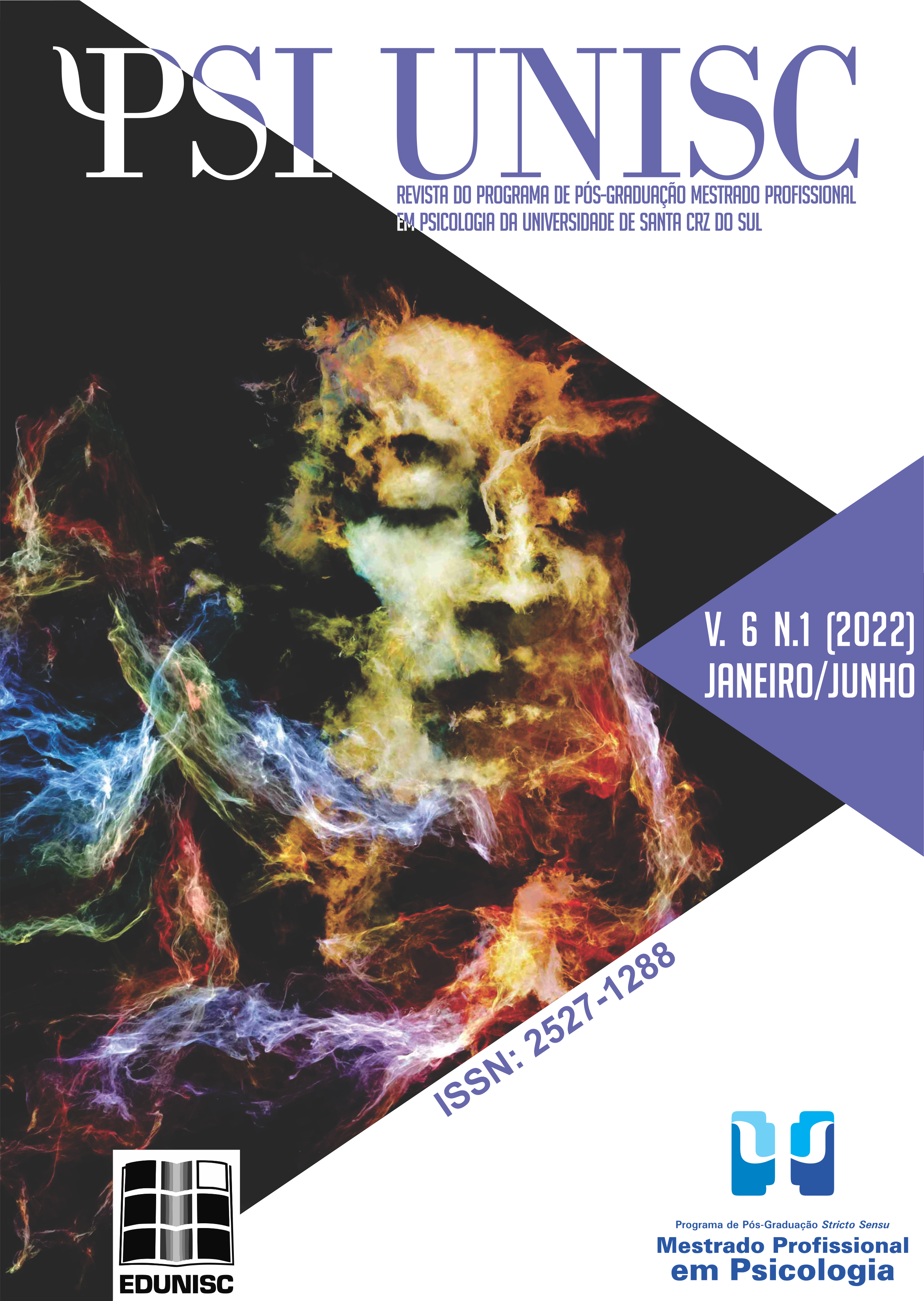Adaptación transcultural de la Heartland Forgiveness Scale (HFS) en muestra de mayores brasileños
DOI:
https://doi.org/10.17058/psiunisc.v6i1.17278Palabras clave:
Anciano, Perdón, Adaptación transculturalResumen
La Escala de Perdón de Heartland (HFS) es un instrumento que mide la disposición de una persona a perdonar en relación con los demás, con uno mismo y situaciones que están fuera del control de cualquier persona. El presente estudio tuvo como objetivo traducir y adaptar transculturalmente la HFS para la población de mayores brasileños. Para tanto, el método de adaptación se dividió en etapas: definiciones conceptuales y revisión de literatura; traducción y síntesis de traducciones; retrotraducción; análisis de expertos; estudio piloto y elaboración de la versión final del instrumento; primeros análisis psicométricos de la versión final. En las etapas de traducción, retrotraducción y análisis experto participaron cuatro traductores y dos psicólogos expertos. El estudio piloto contó con la participación de 32 mayores de la región sur de Brasil, con edades entre 60 y 89 años, la mayoría con nivel educativo alto. Se utilizó una ficha sociodemográfica y la HFS. De este estudio, aunque en un carácter inicial, se puede concluir que el HFS está adaptada transculturalmente para la población anciana brasileña. Por tanto, se puede aplicar en una muestra mayor para que pueda ser sometido a análisis psicométricos para su validación. La adaptación de instrumentos de otras culturas en este tema es necesaria para la realidad brasileña debido a la escasez de estudios en el área del perdón, especialmente con esta poblacion. En el futuro, también puede contribuir al desarrollo de técnicas de intervención y creación de estrategias dirigidas a prevenir y promover la salud de los mayores.
Descargas
Citas
Allemand, M. (2008). Age differences in forgivingness: The role of future time perspective. Journal of Research in Personality, 42(5), 1137–1147. doi: 10.1016/j.jrp.2008.02.009
Artes, R., & Barroso, L. P. (2016). Introdução estatística à avaliação das escalas. In C. Gorestein, Y. Wang, & I. Hungerbühler (Orgs.), Instrumentos de Avaliação em Saúde Mental (pp. 23-36). Porto Alegre: Artmed.
Beaton, D., Bombardier, C., Guillemin, F., & Ferraz, M. B. (2002). Recommendations for the cross-cultural adaptation of health status measures. New York: American Academy of Orthopaedic Surgeons, 12, 1-9.
Borsa, J. C., Damásio, B. F., & Bandeira, D. (2012). Adaptação e validação de instrumentos psicológicos entre culturas: algumas considerações. Paidéia, (53), 423432.
Cassepp-Borges, V., Balbinotti, M. A., & Teodoro, M. L. (2010). Tradução e validação de conteúdo: uma proposta para a adaptação de instrumentos. In L. Pasquali (Org.). Instrumentação psicológica: Fundamentos e práticas (pp. 506-520). Porto Alegre: Artmed.
Cooper, H., Camic, P., Long, D., Panter, A. T., Rindskopf, D., & Sher, K. J. (2012). APA handbook of research methods in psychology, Vol 1: Foundations, planning, measures, and psychometrics. Washington, DC: American Psychological Association.
Cronbach, L. J. (1951). Coefficient alpha and the internal structure of tests. Psychometrika, 16(3), 297-334.
Dahiya, R., & Rangnekar, S. (2020). Forgiveness in Indian organizations: a revisit of the heartland forgiveness scale. Current Psychology, 39(6), 2174-2191.
Fagundes, A. J. D. F. M. (1999). Descrição, definição e registro de comportamento. Edicon.
Gallo-Giunzioni, K., Prieto-Ursúa, M., Fernández-Belinchón, C., & Luque-Reca, O. (2021). Measuring forgiveness: psychometric properties of the Heartland Forgiveness Scale in the Spanish population. International journal of environmental research and public health, 18(1), 45. doi: 10.3390/ijerph18010045
Godoy Izquierdo, D., Martínez, A., & Godoy, J. F. (2009). Balance afectivo en hombres y mujeres: Implicaciones de la edad y el sexo. Psicología Conductual, 17(2), 299319.
Ikedo, F., Castro, L., Fraguas, S., Rego, F., & Nunes, R. (2020). Cross-cultural adaptation and validation of the European Portuguese version of the heartland forgiveness scale. Health and quality of life outcomes, 18(1), 1-9.
McCullough, M. E., & Witvliet, C. V. (2002). The psychology of forgiveness. Handbook of positive psychology, 2, 446-455.
Organização Mundial da Saúde [OMS]. (2002). Active ageing: a police framework. Recuperado de https://apps.who.int/iris/handle/10665/67215
Pasquali, L. (2016). Princípios de elaboração de escalas. In C. Gorenstein, T.-P Wang, I. Hungerbühler (Orgs.), Instrumentos de avaliação em saúde mental. Porto Alegre: Artmed.
Ramírez, E., Ortega, A. R., Chamorro, A., & Colmenero, J. M. (2014). A program of positive intervention in the elderly: Memories, gratitude and forgiveness. Aging & mental health, 18(4), 463-470. doi: 10.1080/13607863.2013.856858
Rodrigues, G. V. A., Giacomoni, C. H., & Argimon, I. I. L. (2019) Perdão: ressignificando vivências adversas. In I. I. L. Argimon, A. A. Moraes, C. V. Quiroga, & G. V. A. Rodrigues (Orgs.). Avaliação e Intervenção no Ciclo Vital: da Promoção de Saúde à Prática Clínica (1 ed., pp. 181192). São Paulo: Hogrefe.
Seligman, M. E. (2002). Positive psychology, positive prevention, and positive therapy. In C. Snyder, & S. J. Lopez (Eds.), Handbook of positive psychology (pp. 3-12). New York: Oxford University Press.
Suzman, R., Beard, J. R., Boerma, T., & Chatterji, S. (2015). Health in an ageing world—what do we know?. The Lancet, 385(9967), 484-486.
Streiner, D. L., Norman, G. R., & Cairney, J. (2014). Health measurement scales: a practical guide to their development and use. New York: Oxford University Press.
Thompson, L. Y., Snyder, C. R., Hoffman, L., Michael, S. T., Rasmussen, H. N., Billings, L. S., Heinze, L., Neufeld, J. E., Shorey, H. S., Roberts, J. C., & Roberts, D. E. (2005). Dispositional forgiveness of self, others, and situations. Journal of personality, 73(2), 313-360.
Toussaint, L. L., Owen, A. D., & Cheadle, A. (2012). Forgive to live: Forgiveness, health, and longevity. Journal of Behavioral Medicine, 35(4), 375-386. doi: 10.1007/s10865-011-9362-4
Veras, R. (2009). Envelhecimento populacional contemporâneo: demandas, desafios e inovações. Revista de saúde pública, 43, 548-554.
Hungerbühler, I. & Wang, Y. P. (2016). Aspectos transculturais na adaptação de instrumentos. In C. Gorenstein, T.-P Wang, I. Hungerbühler (Orgs.), Instrumentos de avaliação em saúde mental. Porto Alegre: Artmed.
##submission.downloads##
Publicado
Cómo citar
Número
Sección
Licencia
La presentación de originales para esta revista implica la transferencia, por parte de los autores, de los derechos de publicación impresa y digital. Los derechos de autor para los artículos publicados son del autor, con los derechos de la revista sobre la primera publicación. Los autores solo podrán utilizar los mismos resultados en otras publicaciones indicando claramente esta revista como el medio de publicación original. Debido a que somos una revista de acceso abierto, se permite el uso gratuito de los artículos en aplicaciones educativas y científicas siempre que se cite la fuente según la licencia CC-BY de Creative Commons.




